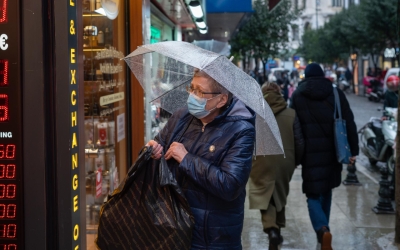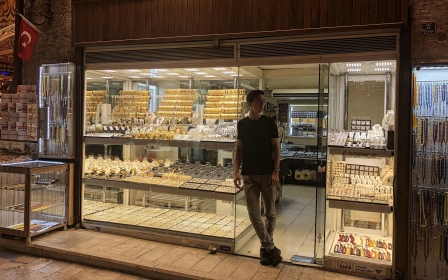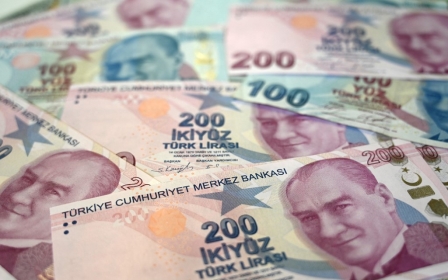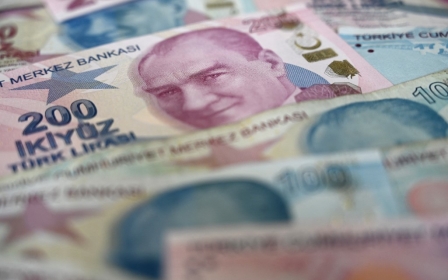Turkish lira: Book publishers pushed to brink by currency crisis

Many industries around the world are suffering from supply chain problems due to the continuing effects of the Covid-19 pandemic. But Turkey’s book publishers face a bigger problem: the rapid devaluation of the lira has pushed the price of paper and international licences to unsustainable levels leaving some struggling to print any books at all.
According to data from the Pew Research Center, inflation rates rose all over the world in 2021. While Brazil, Turkey, and the US, have been experiencing the highest inflation increases, Turkey has faced the unmatched loss of value of its currency.
One dollar, which was rated at 7.3 lira in January 2021, went up as high as 13.42 lira on 3 January 2022: an increase of more than 80 percent in less than a year.
This increase has hit the country’s publishing sector like a tornado. Almost all of Turkey’s small and medium-sized book publishers have halted production, while large publishing houses have lowered theirs to more than half of last year’s numbers.
Not one, but two major issues have arisen as a result of the lira crisis: the constantly rising price of imported book paper and a general increase in international licensing fees for translated books.
New MEE newsletter: Jerusalem Dispatch
Sign up to get the latest insights and analysis on Israel-Palestine, alongside Turkey Unpacked and other MEE newsletters
'We are heading towards a market where book prices would be raised three to four times a year'
- Kenan Kocaturk, Turkish Publishers Association president
Worldwide supply chain issues, brought on by the pandemic, had already caused the price of book paper to increase from $650-$700 per tonne to $1,300 last year.
These prices when combined with an almost 80 percent increase in exchange rates and skyrocketing prices of other materials used in book production, such as glue and ink, have made publishing new books impossible.
The cost of printing a book is now at least 200 percent higher than in 2020, according to the president of the Turkish Publishers Association Kenan Kocaturk.
In 2021, publishers tried hard not to pass on these new production costs to readers, and book prices have risen only about 20-30 percent so far.
“Since this hike was done when the dollar was around nine lira, it does not even mean anything anymore for the publishers under current circumstances,” Kocaturk tells Middle East Eye. “We are heading towards a market where book prices would be raised three to four times a year."
Paper supply
Turkish publishers buy most of their paper from Portugal. Many European countries import from Norway and Sweden, which produce most of Europe’s paper used in publishing. Canada and Russia are the other big paper exporters thanks to their immense resources.
Cem Erciyes, the publishing director of one of Turkey’s largest publishing houses, Dogan Kitap, explains why they slowed down production: “Even if we somehow find the money to print more books, our production costs will be very high. If we adjusted our book prices accordingly, the readers would not be able to afford to buy these books,” he said.
“Therefore, almost all of the small and medium-sized publishing houses of the country ceased production, while larger ones slowed down significantly.”
Dogan Kitap published 20 books in January 2021, but Erciyes is planning on releasing only 10 for the same month in 2022. He says the sector went through a similar crisis in 2018 because of a rapid increase in the dollar’s exchange rate, but fortunately the market then stabilised again quickly.
"But this time exchange rate hike is happening with a much steeper acceleration,” he added.
Rising fees
Another important issue Turkish publishers are facing because of the currency crisis is the increase in international licensing fees for books translated from English.
“With the pandemic, all major international publishing houses have reduced their staff. They do the same or more work with less staff,” Kocaturk said.
"Consequently new standards were set in licensing prices. When the copyright and licensing fees get that high, we cannot afford them, and [the] Turkish public cannot reach international publications. This may harm the cultural diversity of developing and crisis-ridden countries like us.”
But, as Erciyes puts it, “Turkey is a translated book heaven”. Half of the books published every year are translations, and mostly from English. Publishers make most of their money from translated books.
“At the moment, publishing translated books would be madness for us,” he said.
“Unfortunately, the publishing houses in the West and the agencies who represent the authors do not understand our problem. There are a lot of publishers in Turkey who survive only by printing translations. I am mostly worried about them. I hope they don’t have to close shop.”
Vahit Uysal is a veteran of the Turkish publishing industry. He has worked in many small and large publishing houses for 35 years. Now he runs his own small imprint Siyah Kitap (Black Book) and works for the Istanbul Metropolitan Municipality’s own publishing department. His imprint is one of those small companies which rely on translated books to survive.
Siyah Kitap has not published a book in three months. Although Uysal has 25 finished manuscripts waiting to be printed, he cannot afford to buy paper to print them.
“At the moment, the situation is so bad that Turkish people have to choose between buying a litre of cooking oil and a book! If I were them, I would choose food as well.”
Uysal expects some of the small-scale publishers to “act smart”, come together to merge their resources, and work together. He says the government is taking a small step now to help but not doing it the right way.
“The Ministry of Culture is buying some books for state-funded libraries to support the publishers. For instance, if I apply with 30 of my books, they will buy about 100 or 200 copies of about 25 of these titles.
"But we are going through a huge crisis. They must be fair,” he added. “They should not use this fund to buy from publishing giants such as Alfa, Dogan Kitap, Can and Iletisim. Selling 200 books is nothing for them, whereas it could save a small publisher. Large publishing houses themselves are aware of this. They would not object.”
Erciyes, Uysal, and Kocaturk all believe that the least the government could do is to reduce or abolish taxes on imported paper and subsidize book imports so that the industry can be protected during times like this. But they are not very optimistic about getting help from the government.
Culture concerns
Erciyes worries that this perfect storm is a threat to Turkish culture.
“Publishing means literature, free thought, culture… It’s a vessel to deliver different ideas and opinions from the world to Turkish people,” he said. “Books have always been the most important means of freedom of expression. When these books cannot be published, Turkey will lose its culture. Freedom of expression will suffer.”
Erciyes said that unlike in countries such as Germany, France, and the UK, there are no measures to support the publishers, authors, or bookstores in Turkey.
'We Turks are very adaptable. Even if the exchange rates and inflation stay high, we will somehow adapt and continue to publish, and read'
- Cem Erciyes, publisher
Plus, President Recep Tayyip Erdogan’s AKP government has a bad reputation when it comes to freedom of expression. Many of the country’s writers, journalists, and intellectuals have been imprisoned during his party’s 19-year reign.
When asked if he thinks the government is concerned about a possible cultural decay emanating from this financial crisis, Erciyes said he believes Erdogan doesn’t care about the state of publishing industry. “I do not expect any support from the government as a publisher,” he added.
“To be fair, sales tax on books was abolished two years ago during this regime, but that is about the only thing they have done for us.”
A Turkish government official, responding to questions from MEE, said that the government doesn’t currently have a plan to support the industry.
Kocaturk does not expect much from the government either. “It is as if there is fire everywhere right now," he says. "I do not think the government will prioritise our problems while the country is burning. They have to deal with this fire. We will come out of this crisis only with solidarity with our readers.”
Undoubtedly 2022 will be a very difficult year for book publishing in Turkey. But the publishers have not thrown in the towel.
“We Turks are very adaptable," says Erciyes. "Even if the exchange rates and inflation stay high, we will somehow adapt and continue to publish, and read. Maybe the market will shrink, but it will not collapse.”
This article is available in French on Middle East Eye French edition.
Middle East Eye delivers independent and unrivalled coverage and analysis of the Middle East, North Africa and beyond. To learn more about republishing this content and the associated fees, please fill out this form. More about MEE can be found here.





